Even if you don’t particularly like to cook, having access to fresh herbs right outside your door can elevate your meals to near-gourmet! Here are some of the easiest – and most unusual – herbs for Central Florida.
Cuban oregano (Plectranthus amboinicus) – Also called Broadleaf Thyme, this semi-succulent mint is so easy to grow that it’s a staple in our Plant Propagation classes – stick a cutting in some potting soil and you have a new plant! It’s also listed as Florida Friendly, needing only well-drained soil and little, if any, extra water. Its large velvety leaves add interest to that semi-shady spot in the garden that can be a challenge for Mediterranean herbs, and come in solid green or variegated varieties. Use it as a substitute for oregano, or as an ingredient in an authentic sofrito or jerk sauce. Almost two feet tall and sprawling, one plant will supply all your cooking needs. Protect from freezes, maybe by keeping a cutting on a sunny windowsill. Older plants decline with time, so starting fresh cuttings every spring is a good practice.
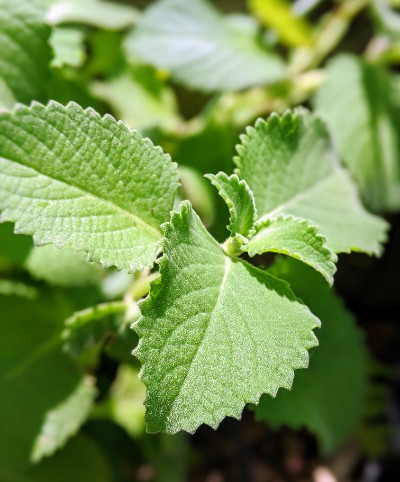
Thai basil (Ocimum basilicum var. thyrsiflora) – Thai basil is not only a great culinary herb, it’s also an attractive ornamental that pollinators can’t get enough of. I’ve even spotted finches eating the seeds right off the bush. Related to sweet basil, it has a strong licorice flavor. It’s easy to grow from seed in warm weather, and transplants are available at most nurseries and big box stores. In semi-shady spots it will stay short, about two feet tall, but it can make a beautiful four foot bush in the sun. The plant will live for a year or more before declining, then seedlings will pop up to take the parent’s place.
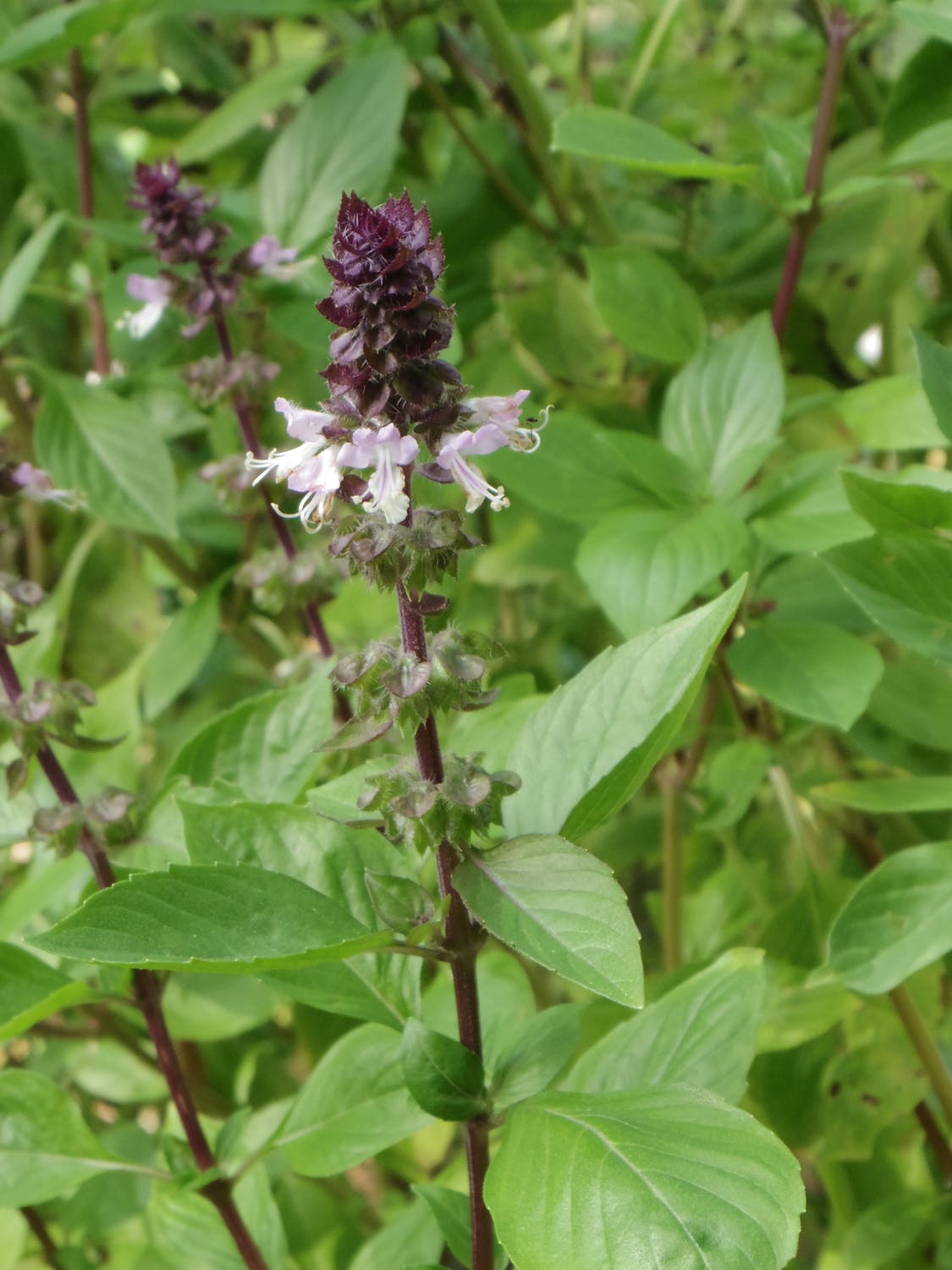
Holy basil (Ocimum sanctum) – Holy basil, or Tulsi, is also related to sweet basil but has a hotter, clove-like flavor. It grows into a sturdy three foot high bush that loves heat and reseeds freely. Some cultures use it for antioxidant, stress relieving, and anti-inflammatory properties. Use it raw in smoothies and salads, and in spicy Thai stir fry. Get seeds online from amazon or rareseeds.com.
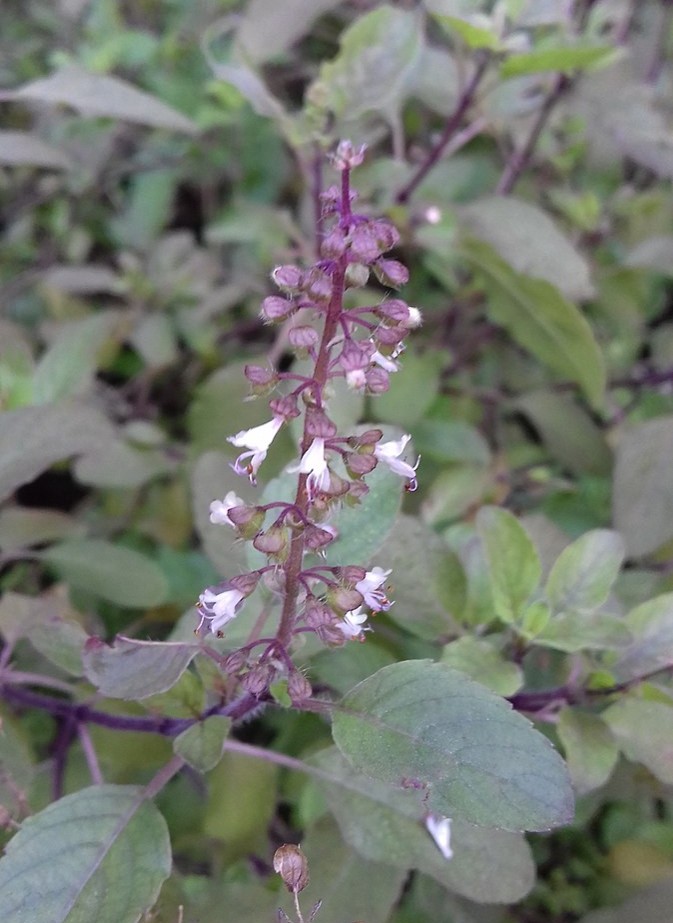
Rosemary (Rosmarinus officinalis) – Rosemary is easy to grow and is one of my most-used herbs, gracing everything from breads to marinades to dips.Give it lots of sun and good drainage; it doesn’t like wet feet. In the ground it can grow to a six foot hedge, but it will stay smaller in a pot. It’s a nice ornamental plant for a porch, as it doesn’t need much water. Most nurseries carry transplants of upright cultivars, and prostrate forms can be found online.

Mint (Mentha spp.) – I once had a pot of mint on my desk, and thinking it had died while I was on vacation, dumped it outside my porch door. Two years later, I finally paved over the area to stop the mint’s spread. To avoid having a yard full of mint (not that it would be a bad thing), grow it in a pot. Keep it moist and give it some shade. Every few years, when the vines have wound around the inside of the pot and started to decline, divide it and stick some of the rooted vine in new soil. Besides spearmint and peppermint, there are many intriguing varieties including apple, chocolate, and orange, to name just a few.
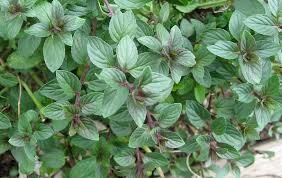
Garlic chives (Allium tuberosum) – Common chives are a bit delicate for Florida heat, but garlic chives, also called Chinese chives, are easy to grow here. The leaves are flat instead of hollow, and they have a pungent onion and garlic flavor. The white blooms are also edible. They form a perennial clump that will keep your kitchen stocked for years. Transplants and seeds are both generally available.
Lemongrass (Cymbopogon citratus) – Lemongrass has a light, spicy lemony flavor that can be added to many dishes such as marinades, teas, rice, and stir-fry. It is a large, attractive grass that grows four to six feet tall in Florida. It likes to spread, so you may want to keep it contained in a large pot, or give it plenty of room at the back of the border. It divides easily, so get a start from a friend, or find it at nurseries as a transplant.
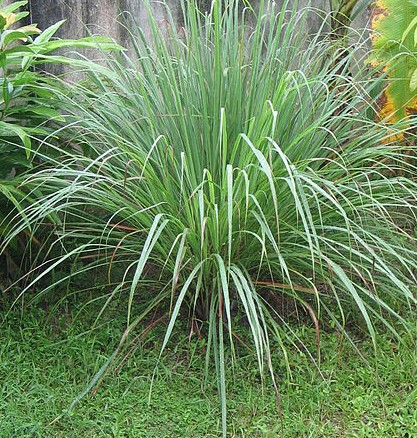
Ginger (Zingiber officinale) and Turmeric (Curcuma longa) – These two herbs are related, and are similar to grow. Both can be started from rhizomes purchased at the grocery store – make sure they are organic or they may have been sprayed with a growth inhibitor. Plants are also available from many sources. Both like rich, moist soil, shade, and have tops that die to the ground in the colder months. They can be grown easily in pots with a saucer to keep them moist, or in the ground where they will form large clumps. For culinary use, I like to break off rhizomes from the edge of the clump as needed. Scrape off the thin outer layer with the edge of a spoon, and slice, grate, or throw in a blender. If you’re like me, once you’ve cooked with fresh, you’ll never go back to powdered. Just be aware that fresh turmeric will turn your hands and utensils temporarily yellow!

Bay leaf (Laurus nobilis) – Bay leaf is an overlooked herb for Florida that is easy to grow here. The leaves come from an evergreen shrub called bay laurel that grows slowly but can make a 12 foot hedge. If you don’t have much space, it can be kept small in a 15 inch pot and still provide plenty of leaves for years of soup. To harvest, pluck the leaves, wash them, and lay them out in a single layer to dry for a week or so. Growing your own provides much fresher leaves than those found in the grocery store. There are lots of plants with “bay” in the name, so check the Latin name to make sure you get the culinary variety. Plants can be purchased from local nurseries or online.

Many common Mediterranean herbs also grow well in Florida in the spring, but tend to decline in summer. It’s easy to understand why when you think about their native Mediterranean climate – hot but dry. Our daily summer thunderstorms bring fungal and root rot problems. To keep your rosemary, oregano, and thyme happy, water at the base of the plant, give them good drainage, and keep their leaves dry. Keep sheltered from summer rains by placing your pot under a porch overhang or eaves the house, and don’t forget to keep them away from overhead sprinklers!
One final note – since 2007, common sweet basil, also called Genovese basil, has fallen victim to a disease called downy mildew. The leaves yellow and the plant declines. This doesn’t mean you’ve lost your green thumb! It’s a relatively new problem, and it took a while to breed resistant cultivars. One such cultivar, called Amazel Basil™, has been developed at the University of Florida. It’s currently available from Proven Winners®. It will grow into a two to three foot bush and has excellent flavor.
There you have it – all the ingredients for an easy-care Florida herb garden. Plant them where you have easy access, and keep a pair of pruning scissors handy. With these outside your kitchen door, you’ll never use dried, bottled leaves again!
Want to learn more? Check out horticulture classes offered by UF/IFAS Extension Orange County at www.gardenflorida.eventbrite.com. Read about Florida-Friendly Landscaping™ at https://ffl.ifas.ufl.edu/. Follow us on Facebook at https://www.facebook.com/GardenFlorida/.
This blog post was written by UF/IFAS Extension Orange County Master Gardener, Mary Ann Pigora, class of 2017. The UF/IFAS Extension Orange County Master Gardener Volunteers play a crucial role in the outreach of UF/IFAS Extension.
 5
5
